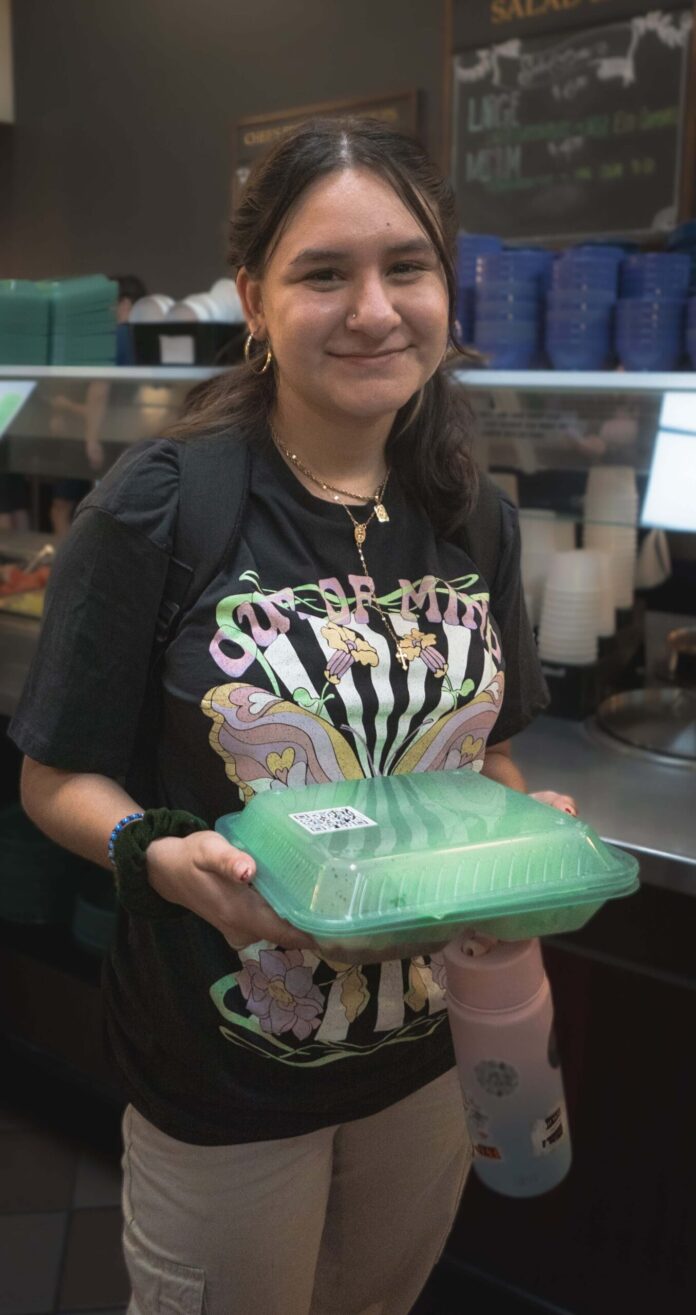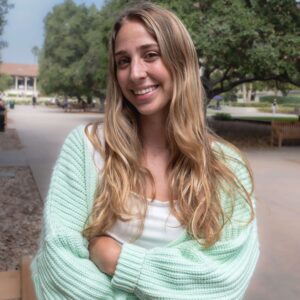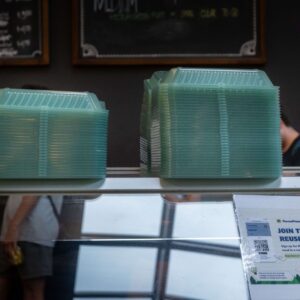
As part of Campus Dining’s commitment to waste reduction, Occidental has introduced a new eco-clamshell program this Fall that completely eliminates disposable containers as to-go options for entrees at the Marketplace.
According to Associate Director of Campus Dining Robert Starec, the switch has already replaced 3,070 single-use containers and saved 351 pounds of food waste, as of Sept. 8. The eco-clamshells have also saved 2,400 gallons of water and diverted 2,500 pounds of CO2 emissions from the atmosphere, according to the report.
According to Assistant Sustainability Coordinator Isabel Merel ’23, this change was driven by student organizing that included extensive research, working groups and petitioning to get the program implemented.
The program expands on the previous opt-in system, which offered students the ability to select reusable containers instead of disposable ones when ordering their food to go.
According to Merel, the new program allows students to ask for their food to-go in green reusable boxes with QR codes printed on them. When students check out, they scan a QR code on their phone before scanning the box and swiping their ID card.
The process is similar to checking out a library book with a three-day return policy, according to Merel. Once students return their box, Campus Dining staff scan it back into the system, wash it and return it to a station.
The program was implemented to combat waste issues the College had been struggling with when it came to disposable to-go boxes, according to Starec.

Occidental’s Landscape Manager Lola Trafecanty said the last year was particularly challenging, with to-go containers overflowing in trash cans and bins across campus.
“At the bottom of Branca patio, in particular, it was always overflowing. The containers weren’t fitting correctly into the trash can, so they would just become stacked. The crows would come – they would take them,” Trafecanty said. “My staff is only here from 6:00 a.m. to 2:30 p.m. So then by dinner time, it was just a mess. And so it was just an overwhelming amount of trash.”
Merel said the change sought to make eco-clamshells a more convenient option for students. The previous program, which relied on a token system with a one-for-one exchange, ran into issues with students forgetting their tokens or eco-clamshell and then not being able to check out a new container. The majority of students continued to use disposable boxes, Merel said.
“We were only getting about 200 uses per week, which was really low given our student body,” Merel said. “It was probably the same 10 or 15 students that were using the eco-clamshells.”
The new program is already making progress in increasing users, according to Starec. According to the Sept. 8 report, 1,334 students signed up and 1,087 checked out a container at least once.
Campus Dining Intern Maia Adams said she hopes these numbers will show students the impact they are making.
“Just being able to see that data and then being able to post that for students and show you are making an impact I think will help encourage people [to use the program] even more,” Adams said.

For Facilities Management, the new system has meant fewer pickups and less overflow clean-ups, Trafecanty said.
Lucy Johnston (sophomore) said the program is much easier to use now that QR codes replaced the tokens.
“It is definitely a step remembering to get my phone out [and go] through the line. I think that frustrates me as much as it does anyone,” Johnston said. “But I think it is a lot easier with the return processes and being able to put it right back through the window.”
Some students have experienced challenges with aspects of the new system. Berret Yuffee (senior) said that the eco-clamshell program is an important sustainability effort, but due to her allergies to nuts, sesame and legumes, she currently cannot participate in the program.
“Everything is cleaned but sometimes there is residue and if you have allergies as severe as mine or anxiety about allergies, that’s severe,” Yuffee said. “I have traditionally used the to-go containers mostly because it is safer.”
According to Yuffee, a solution could be to label some containers nut or sesame-free or to rent her a specific container for personal use.

Campus Dining staff was also trained to assist students in signing up for the program and the scanning process, according to Marketplace cashier Jenny Mendoza.
According to Mendoza, the new system has not had a big impact on her position as a cashier, but comes with more clean-up work for the kitchen staff – who wash the containers twice and scan them back in individually – and issues with students taking plates to-go to avoid the barcode system.
“A lot of students, since they don’t want to sign up, they’re taking the plates and utensils. So we’re losing a lot of plates,” Mendoza said.
While the program has already seen success, Trafecanty and Merel said there is more work to be done. Merel said she wants Campus Dining to expand the program to include more reusable to-go boxes for salad and fruit.
Trafecanty said there needs to be greater education around waste reduction and proper disposal procedures to help the staff who have to transport the waste and sort it at the Mount Fiji dump site.
According to Merel, these measures are all steps in creating a campus culture based on reusables and environmental awareness.
“This is just another step towards that more circular economy that you hear about all the time,” Merel said.
Contact Sarah Jageler at jageler@oxy.edu
![]()






























